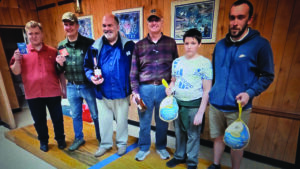 Virginia U.S. Senator James Webb told the monthly breakfast meeting of the Northern Virginia Democratic Business Council in Falls Church last Friday that there’s no way the U.S. can build a stable, pro-western nation in Afghanistan, and that if more U.S. troops are sent in there, it should only be with a clear and realistic notion of “what we want to accomplish” and “how it ends.”
Virginia U.S. Senator James Webb told the monthly breakfast meeting of the Northern Virginia Democratic Business Council in Falls Church last Friday that there’s no way the U.S. can build a stable, pro-western nation in Afghanistan, and that if more U.S. troops are sent in there, it should only be with a clear and realistic notion of “what we want to accomplish” and “how it ends.”
Adding U.S. troops to Afghanistan will add further pressure on supply routes to maintain the added presence, he said, and that may prove a vulnerability. Currently, he said, 80 percent of U.S. military supplies come through Pakistan, which is becoming increasingly unstable.
Alternative supply routes seem even less attractive, he noted. Bringing them through the neighboring “Stans,” he said, would require the cooperation of Russia, and bringing them through Iran would “create a real Catch 22,” he quipped. An airlift is also not a viable option, as the planes would have to fly too far to make it viable.
He said he built his own views on Afghanistan from having visited different places there as a journalist in 2004.
While Webb said that Hillary Clinton “will be a great secretary of state,” he said the U.S. “is in danger of losing a place at the table in Asia” because of the legacy of the Bush administration in the region.
Concerning Iraq, he said, “there will be no true stability in the region until the U.S. is out.” But he noted the agreement that Bush struck with the Iraqis about a withdrawal of U.S. troops by the end of 2011 involved “very loose language” and was “not a mandate.”
Webb reiterated his special concern for U.S. prison incarceration policy, noting that with 5 percent of the world’s population, the U.S. has 25 percent of the world’s prison population. Despite this, he said, there has been no decline in drug use in the U.S. and organized gang activity is up.
Back in the early 1980s, he said, he toured Japanese prisons as a journalist, and then there were only 40,000 in Japanese jails, compared to 570,000 in U.S. jails.
But since, the U.S. imprisoned population has ballooned to 2.38 million, and there are seven million in the criminal justice system, overall.
He said he’s proposed the formation of a National Commission to Examine the Criminal Justice System in America.
Webb said this year’s elections in Virginia will be key, nationally. The state’s races for governor, attorney general, lieutenant governor and state delegate and senate seats, and those in New Jersey, will be the only significant ones nationally, and the outcomes “will resonate in terms of how the two parties are realigning” coming out of the 2008 elections.
On the federal TARP and stimulus packages, Webb said he became convinced by leading economists that without such efforts, and a re-regulation of the financial markets, “the results would have been cataclysmic in the short term.” Even so, he said, it is a “toss-up whether the moves had the proper impact.”
“The problem is,” he said, “that no one knows specifically what the answer should be” to revive the economy. “We have to do whatever will work to get people to trust the economic system again.”
The keys to the stimulus are that the resources “must go into the people’s hands through extended unemployment, food stamps and Pell grants,” as well as into already-approved infrastructure projects and housing relief.
“Helping people who need it and getting new projects going, this approach gives us the best chance to recover,” he said.













